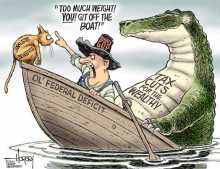Republican Candidates Budgets Would Explode National Debt
Republican Candidates Budgets Would Explode National Debt
At issue is each candidate’s tax plan, which advocates for substantial tax cuts, even doing away with the capital gains tax which has contributed so substantially to the income disparity in this country. Newt Gingrich’s plan would, over the next decade, add $7 trillion to the national deficit, adding a third to entire present national debt. Santorum’s plan would add $4.5 trillion, by comparison, which is about $500 billion every year. Romney’s budget plan at the time of the study would add $250 billion, though a new tax plan he unveiled last week may raise that number considerably. In any case, if any of these three candidates were elected, they would add anywhere between $800 billion and $1.5 trillion by the time they were up for re-election in 2016. By comparison, President Obama’s budget plan would add $649 billion to the national deficit by the end of his second term in 2016, primarily a result of tax increases.
Ron Paul has, by far, the most aggressively limiting tax and budget plan of any of the Presidential contenders. His plan calls for near-austerity cuts in federal spending on everything from entitlements to the military. Paul would immediately end operations in Iraq and Afghanistan, cutting military spending nearly in half. He would also greatly limit programs like food stamps and Medicare, and cut five Cabinet departments from the federal payroll. All said, he would cut nearly $2.2 trillion in federal deficits over ten years. His plan is also the only one that cuts more spending than it does tax revenues.
One of the major differences between GOP candidates and the Congressional Republicans has been their approach to tax reform. Whereas the potential nominees have promised more in the way of tax cuts (largely as a political tool), Republicans in the House and Senate have focused on retaining the Bush Era tax cuts and are open to increasing taxes as part of a larger deficit-cutting deal. Of course, Obama has made the expiration of the Bush tax cuts a major component of his plan to raise $2.2 trillion in tax revenues over ten years. In the general election, it will be interesting to see how GOP candidates resolve their deficit-adding budget plans with the more compromising congressional one, and how that will mesh with Obama message on raising taxes on corporations and the wealthy.



